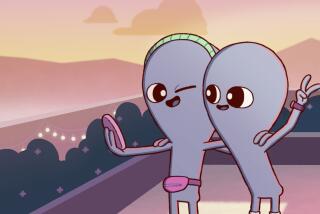The plutocracy deliberates
- Share via
THEY’RE PLAYING FIZZBIN WITH the solar system.
For “Star Trek” illiterati, Fizzbin is a mythical card game created by Capt. Kirk, with rules so arcane and ever-changing that it befuddles unfriendly aliens on Sigma Iotia II. (It’s such a classic TV moment that it has its own Wikipedia entry.)
And befuddled is how we poor Earthlings feel. We once thought we could name the nine planets of our own little corner of the cosmos. Now the rules are getting so complicated that Sigma Iotia II is one of the few planets we can remember with confidence.
Up to now, the word on planets was: Four rocks, four gas balls and a speck of ice way out there called Pluto. Now that astronomers know there are other Pluto-like objects, it would be unfair to call Pluto a planet and not, say, UB313, which has been on the tip of everyone’s tongue since it was discovered in 2003.
It turns out that a planet is like art. Everyone knows what it is, but nobody can define it. That’s because there’s never been a standard definition of “planet.” In fairness to UB313 and Charon and a bunch of other spatial -- uh -- things, scientists are trying to agree on one. Here’s the proposed definition they’re scheduled to vote on this week: A planet is a big mass, roundish in shape, that circles a star. In other words, any number of Hollywood agents would qualify.
Just to complicate matters, Pluto and Charon would be relabeled a double planet, and they would be part of a subset of something else called a pluton, which is a planet that takes more than 200 years to complete a single orbit.
But that’s a narrowly Earth-centric way of looking at the universe. For any given planet (or pluton), one year is however long it takes to circle the sun. A Martian year is longer than an Earth year because, well, Mars takes longer to orbit the sun.
Frankly, all these Plutonic relationships sound like a lot of astronomical-grade inflation. What used to be big asteroids could now be upgraded to planets. We’re looking at 53 possible planets jamming the orbital byways in what used to feel like a relatively spacious solar system. There’s another solution: Downgrade Pluto so that it’s not a planet anymore. It wouldn’t be an asteroid, exactly, more sort of a hybrid. If the name weren’t already taken, they could call it a pluot.
The loss of Pluto would be sad, especially considering the romantic tale of its discovery by Clyde Tombaugh, an Illinois farm boy who, with no formal astronomy training, built his own telescopes and found himself a planet. But we managed without Pluto before its 1930 discovery.
Then again, we could always force our students to memorize 53 names like UB313 -- and then lament how badly they do at science.
More to Read
Sign up for Essential California
The most important California stories and recommendations in your inbox every morning.
You may occasionally receive promotional content from the Los Angeles Times.










